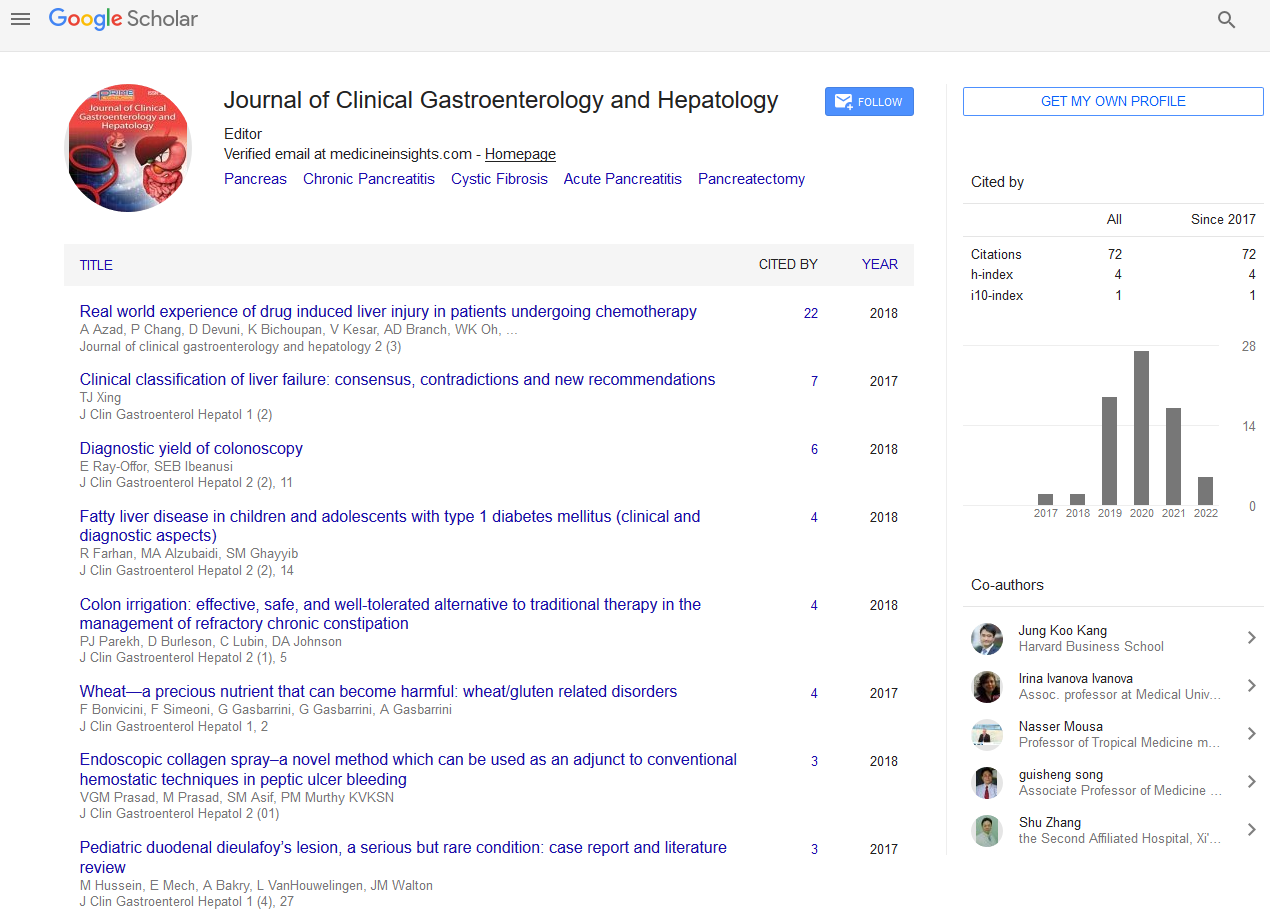Commentary - (2022) Volume 6, Issue 5
A Brief note on Gastrointestinal Diseases and their Effects on Gastrointestinal Tract
Paul White*
Department of Gastroenterology and Hepatology, University of Illinois Chicago, USA
*Correspondence:
Paul White, Department of Gastroenterology and Hepatology, University of Illinois Chicago,
USA,
Email:
Received: 02-May-2022, Manuscript No. IPJCGH-22-13731;
Editor assigned: 04-May-2022, Pre QC No. IPJCGH-22-13731 (PQ);
Reviewed: 18-May-2022, QC No. IPJCGH-22-13731;
Revised: 23-May-2022, Manuscript No. IPJCGH-22-13731 (R);
Published:
30-May-2022, DOI: 10.36648/2575-7733.6.5.21
Description
Gastrointestinal illnesses have an impact on the entire gastrointestinal
(GI) system, from the mouth to the tailbone. There
are two types of usefulness: secondary and primary. Queasiness/
retching, food contamination, lactose prejudice, and stool
looseness are all included in certain models. Gastrointestinal
infections include GERD, loose stools, and colorectal malignant
development. When examined, a few infections appear to have
no negative effects on the GI tract, yet there are nevertheless
side effects. There are side effects to various illnesses, and
there are also visible anomalies in the GI tract. The majority of
gastrointestinal illnesses can be avoided and cured.
Any illness or disease affecting the stomach-related system,
which includes the throat, stomach, and digestive organs, is referred
to as gastrointestinal (GI) illness or disease. Conclusions
could include severe, transient illnesses referred to as “stomach
bugs” at times. GI illnesses come in a variety of forms, including
viral gastroenteritis, food poisoning, and even blockage.
Because there are so many findings that fall under the category
of GI illnesses, your MedExpress clinical team may need information
regarding your side effects and late exercises, among
other things, to help them make their decision. For persistent
difficulties, patients may be referred to a gastroenterologist.
Experts may be able to help the patient decide how to adjust
their lifestyle, food, medications, or deal with their ongoing
side effects. When your medical care provider suspects major
concealed issues, contacting the crisis department as soon as
possible is critical.
Problems can arise in any part of the gastrointestinal tract,
affecting stomach-related work in general. When you eat, absorption
is a pre-programmed process that breaks down the
food into small pieces so that it can be used in a supplement
structure inside the body. These supplements are necessary for
energy, and they can also be used as cellular building blocks.
Food enters your mouth, travels down your throat, and eventually
reaches your stomach. The stomach-related processes
then continue as the food particles pass through the large and
tiny digestive organs. The liver, gallbladder, and pancreas are
other important organs that regulate the digestive system’s capability.
Every year, a substantial number of Americans are affected
by stomach problems. The intestine system, often known as
the gastrointestinal (GI) tract, is one of these conditions. The
throat, liver, stomach, small and digestive organs, gallbladder,
and pancreas are all part of the GI tract. Stomach problems
encompass a wide range of illnesses, from minor to severe.
Gastroesophageal reflux illness, infection, peevish inner state,
lactose narrow mindedness, and hiatal hernia are all common
stomach problems.
Dieting, ballooning, stoppage, the runs, indigestion, anguish,
queasiness, and spewing are some of the most well-known
adverse symptoms of stomach-related issues. Gathering a
thorough clinical history and leading an actual assessment are
both necessary steps in accurately diagnosing stomach-related
issues. A small number of patients with stomach disorders may
require more extensive diagnostic testing, including endoscopic
techniques. Gastrointestinal diseases affect any part of the
gastrointestinal tract, from the throat to the rectum, as well as
the stomach’s ancillary organs such as the liver, nerve bladder,
and pancreas. The word encompasses a wide range of illnesses,
such incendiary entrail infection and utilitarian dyspepsia, and
encompasses intense, chronic, recurring, or useful difficulties.
Acknowledgement
None.
Conflict of Interest
Authors declare no conflict of interest.
Citation: White P (2022) A Brief note on Gastrointestinal Diseases and their Effects on Gastrointestinal Tract. J Clin Gastroenterol Hepatol. 6:21.
Copyright: © White P. This is an open-access article distributed under the terms of the Creative Commons Attribution License, which permits unrestricted use, distribution, and reproduction in any medium, provided the original author and source are credited.

